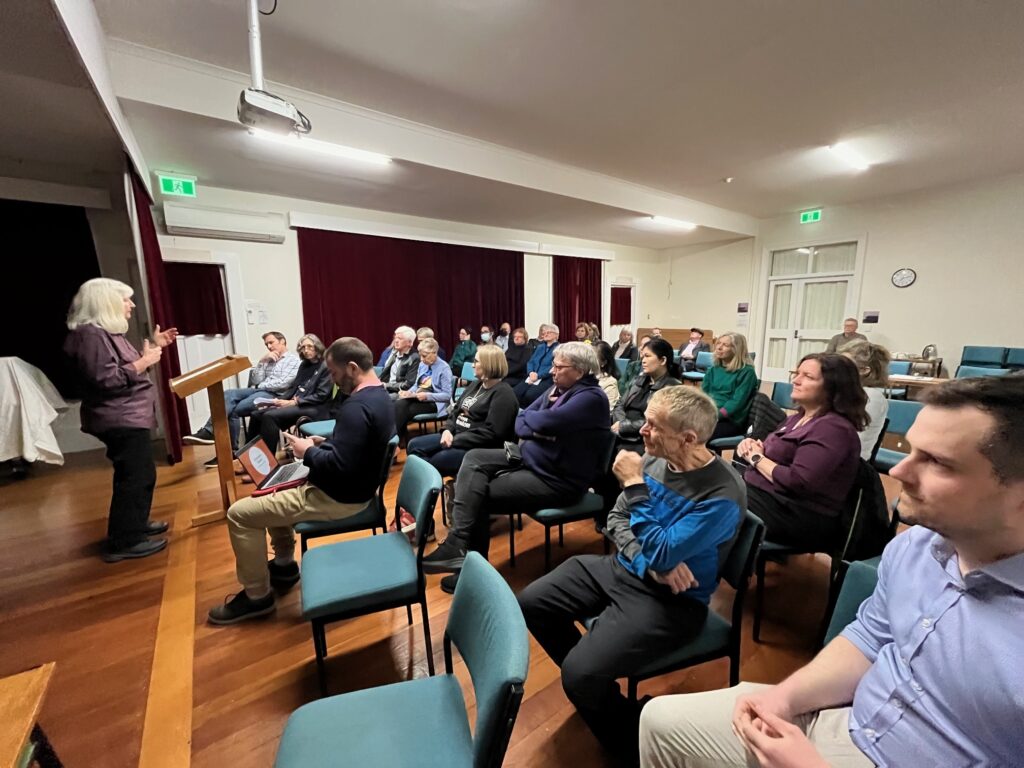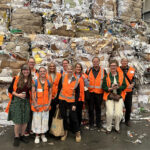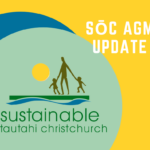At our community board meeting, we heard from three speakers with in-depth knowledge about community boards.
Community boards offer a means to directly address some of our pressing sustainability issues at a local level that removes politics from the equation: you have greater access to your community board member than other elected officials, and they are a great place to go with solution-oriented ideas.
Jenny Hughey spoke about the history and context of community boards. As the past chair of ECAN (or as Jenny prefers, Canterbury Regional Council) and a longtime advisor to community boards, she emphasized that community boards may not be visible, but they are happening all the time. She hopes for increased delegation of decision making and resourcing of the community boards by Council. Overall, she emphasizes the need for more local decision making.
Aotearoa New Zealand has a unique history of self-determination and local governance, with Maori self-governance at the iwi and hapu levels and European settler self-governance from an attitude of frustration with larger national governments. Over time, these smaller councils, statutory boards and community boards, have been consolidated and often their power removed and subsumed by city, regional, and national-level governments. The number of community boards differ from city to city in Aotearoa, and in Ōtautahi Christchurch we are lucky to have six community boards. While Christchurch City Council has delegated some actions to community boards, overtime their delegation and funding have decreased.
When thinking about sustainability and climate change, Jenny suggested community boards can be a vital tool for public action.
When community boards are given good oversight (from journalism and the public), engaged with in good faith (no trolls!), and given proper delegation and funding, they can be a powerful tool for starting local, impactful projects, building trust and engagement with government and the democratic process, and can be a powerful tool for strong sustainability.
What you can do:
- Set up a resident’s association (or join yours) to lobby community boards
- If Council isn’t making an issue you care about a priority, bring it to your community board.
Jenny’s challenge and your homework: before the end of the year attend one of your community board meetings or touch base with them to get talk about getting more sustainability and environmental issues on their agendas.
Paul McMahon Is the chairperson of the Linwood community board and has been a community board member since 2010.
One of Paul’s core philosophies is that the state should exist to redistribute power outwards. He thinks specific issues should be dealt with and decided within the local locality, and that council should not be able to change a community board’s decisions. Paul believes that like city, regional and national councils, community boards make mistakes but should be allowed to fall rather than be taken over by more consolidated power. Community boards are also an avenue for advocating for larger regional decisions.
Decentralized decision making can help diffuse situations that may have become politicized. For example, it’s much easier to ask for clean waterways that run through your neighborhood and suggest direct actions for them than ask for all waterways to be clean. This is also a good way to start pushing for change: start small!
Community boards often have little media scrutiny, and can make more decisions in that information vacuum. Community boards are a fabulous tool, but they need engagement, oversight, funding, and delegation in order to function properly.
Your call to action: get to know your local representatives. Email them and tell them what you think! Come with a solution to a problem, ask for problems to be placed on their agenda. And, maybe you or someone you know should be standing for office. People who are competent with good people skills and a reluctance to power are great candidates.
Mike Davidson is the former city councillor for Papanui and is on the list of possible Greens MPs.
When first elected to his community board in 2013, a major cycleway discussion was happening and Mike realized how important safe cycleways are for promoting healthy movement, lowering emissions, reducing traffic, and creating a better community. It turned him into the cycling guy, and it was great to hear how this all started.
Transport is the largest source of emissions for Christchurch and has become a thorny, politicized issue.
Mike pointed out that true choice in transport is when people will voluntarily not take a car and choose other means of transport like buses and bikes because they are more desirable. Mike points out that we have spent decades investing in car infrastructure which has had the knock-on effect of making it undesirable to take the underfunded public transport and cycleway systems. Now, that balance is shifting to better and better cycleways in Christchurch, but it’s critical that we keep pushing for funding and safe transport infrastructure.
Mike would like to see more delegation to community boards for local transport. Often, for the communities affected by new transport projects, their perspective differs greatly from that of the larger city and region. For example, fast speed limits may be desirable for commuters going through an area but can be dangerous for local residents.
Mike also advocates for governance training of all our elected officials and encourages us to go to our community boards and advocate for safe, sustainable transport so that they can’t ignore it!
We are so grateful to Jenny, Paul, and Mike for their time and to all of those who came to the event and made it engaging. Don’t forget about your homework, even if you weren’t able to make it!



